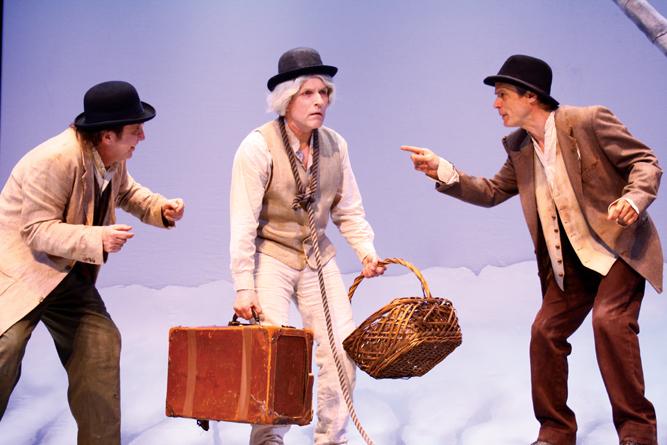‘Waiting for Godot’ aims for humor over easy answers
June 3, 2014
While preparing for their performance of “Waiting for Godot,” director Aoife Spillane-Hinks and her cast often found that the best judge of quality was a 5 year old — the brother of a young actor in the play.
“He’s the test,” Spillane-Hinks said. “And if a 4- or 5-year-old can laugh, then you know you’ve got it. We’ll be running the play, and we have all of these jokes, and you hear [him] from the back of the theater.”
“Waiting for Godot,” the classic 1953 play written by Samuel Beckett, will be presented by Pittsburgh Irish and Classical Theatre Classic Theatre starting Thursday, June 5 through the 21, at the The Charity Randall Theatre. Starring Martin Giles, James FitzGerald, Ken Bolden and Alan Stanford, the absurdist and tragic comedy tells the story of Didi and Gogo, as they wait, wait and wait some more for Godot.
Vivian Mercier attested in his famous review of the two-act play in The Irish Times that Beckett “has written a play in which nothing happens — twice.” But according to Stanford, “Waiting for Godot” has been profoundly important.
“This is the most significant play of the 20th century. It changed the way everything was written,” Stanford said. “The influence that this play has had on writers, from Pinter to Mammone to Albee, they all acknowledge that, but [if not] for this play, their writing would not have been what it was.”
Steve Guinn, who will be giving a lecture about the play before the performance on Wednesday, June 11, echoed these remarks.
“I think it’s one of the most important plays,” said Guinn. “It shows that you can present life, tragedy and comedy really in a simpler format.”
Despite their differing genres, Stanford said “Godot” has influenced some of the most iconic horror films, such as “Night of the Living Dead.”
“You have people in a situation where they have fear and they have hope,” said Stanford. “They are waiting for one of two things to happen: They are waiting for Godot to come or night to fall. Godot, in that sense, is help.”
Since its earliest performances, the play has prompted several questions, including the identity of Godot and if, or when, he might show up. Spillane-Hinks’s production doesn’t seek to provide clarification.
“What is Godot? It’s what you’re waiting for. In other words, it is your expectations. And we all spend our lives waiting. From the moment you’re born to the moment you die, you wait,” said Stanford. “What the play is doing is putting a canvas up and saying ‘This is what you do all your life. You work it out.’”
Despite the play’s prestige and complicated themes, Spillane-Hinks encourages audience members to not be intimidated.
“You could be tempted to despair because it’s so overwhelming. It’s oh so overwhelming and complicated and too smart for you, that you can’t actually go into it. But, that’s not true,” said Spillane-Hinks.
Rather than over-thinking the role or identity of Godot, theatergoers can instead immerse themselves in the play’s purity and humor.
“One of the ways that people deal with life and waiting is humor,” said Guinn. “Life can have its absurd elements, but we’re born and we wait and we die. It’s a play all about life.”
Correction Note: An earlier version of this article incorrectly referred to Vivian Mercer’s take on “Godot” as “her famous review.” It has since been corrected to “his famous review.”








